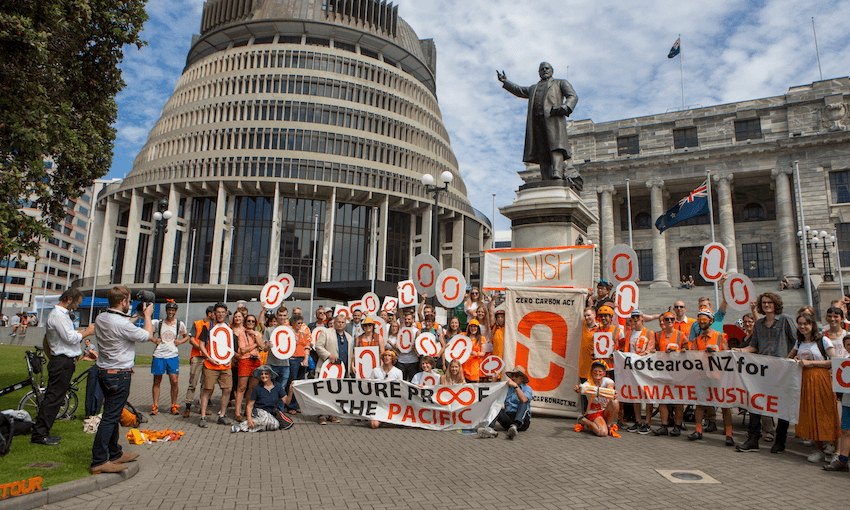Submissions to the Zero Carbon Bill close on Thursday July 19. Laura Somerset, a Wellington-based convener of Generation Zero, looks back on the early days of the climate action movement.
At 16, I unwittingly became a climate activist because I wanted to skip English class.
The year was 2016. Selfie sticks were emerging and global greenhouse gas emissions were at record high levels, yet the idea of caring about climate change was still radical in the minds of most New Zealanders, including my own.
Through the high school grapevine I heard tales of a youth-led climate organisation looking for new members to join their annual hui up the coast. Generation Zero had been established five years earlier by a ragtag team of university students who were concerned about New Zealand’s inaction on climate change. Incidentally, their hui that year was during school time: at this, my ears perked up. Never one to pass up the opportunity to miss a day of school, I graciously agreed to attend.
Unsure of how to admit that I had only joined for a long weekend away, I began quietly showing up to regular meetings and nodding my head at the appropriate times.
Shortly after I joined Generation Zero, we launched the Zero Carbon Act campaign. The idea for the Zero Carbon Act came from the grassroots campaign and subsequent passing of the UK’s 2008 Climate Change Act, which established an ambitious plan to reduce national greenhouse gas emissions. It was passed almost unanimously across all political parties.
The UK Climate Change Act campaign managed to spark a national conversation on climate change that our country desperately needed. And so, during a meeting one evening in the library cafe, Generation Zero decided to draft our own climate change law.
Our volunteers got to work on adapting the UK Climate Change Act model to suit the New Zealand context. The ones who were studying policy and law would finish up their classes and day jobs and race to the cafe, developing policy frameworks over the cheapest item on the menu. The rest of us got stuck into engaging with members of the community to ensure policy represented the interests of all New Zealanders.
We hosted a bike tour that sent volunteers to bike the length of Te Ika-a-Māui (the North Island), speaking with rural communities about climate change along the way. We showed up to every public meeting, every panel, and every conference to spread our message. We held house parties in our flats to convince party-goers to join the cause, and we pestered MPs to meet with us.
I had always felt alienated by environmentalists because I was, frankly, uninterested in the environment. Bookish and urban to my core, my childhood was spent in fear of the next occasion when my parents would force me to go tramping. Now that I was working on the Zero Carbon Act campaign though, it started to dawn on me that climate change was really a social justice issue.
While I was ambivalent towards the sight of a polar bear, I did care that an estimated 250,000 people would die from climate-change-related causes every year by the time I reached 30. I cared that my home, Wellington, would be devastated by sea level rise like most of New Zealand’s coastal urban centres. I cared that some Pacific Islands would be completely submerged by 2050, leaving thousands of displaced refugees.
I realised that caring about people was synonymous with caring about the environment where they make their homes and carry out their lives.
In 2017, the youth wings of National, Labour, Green, and the Māori party endorsed the Zero Carbon Act. Jan Wright, the then-Parliamentary Commissioner of the Environment released a report which called for the adoption of the Act, as did the Productivity Commission. The New Zealand divisions of the United Nations, Oxfam, World Wildlife Fund, and UNICEF, all pledged their endorsements. From university campuses to workplaces to our grandparents’ rest homes, New Zealanders were backing the Zero Carbon Act.
At the end of 2017, two years after we launched our campaign, the Government announced its plans to pass the newly titled Zero Carbon Bill into legislation.
We made history.
In a photo of the Zero Carbon Act campaign launch in 2016 the camera had to zoom in so that the sparse crowd wasn’t so apparent. In 2018 when we gathered outside Parliament to celebrate the promise that the Bill would be passed, so many people showed up that we couldn’t fit everyone in the picture.
But our job isn’t over yet. Public consultation on the Zero Carbon Bill closes this Thursday 19 July, and we’re out there encouraging as many public submissions as possible so that the Bill supports the values of a fair and just society. We also need all political parties onboard with this proposed law so that it remains salient regardless of the Government in power at the time. Climate change transcends political agendas. News that we now have endorsements from New Zealand Farming Leaders Group, Simon Bridges, and over 200 businesses gives me hope for cross-party support of the Bill.
This year I turned 19 and moved out of home. In October the Zero Carbon Bill will be introduced in the House and next year it will be passed into law. Oh, how they grow up.
Have your say while you still can. Make your submission to the Zero Carbon Bill here.

